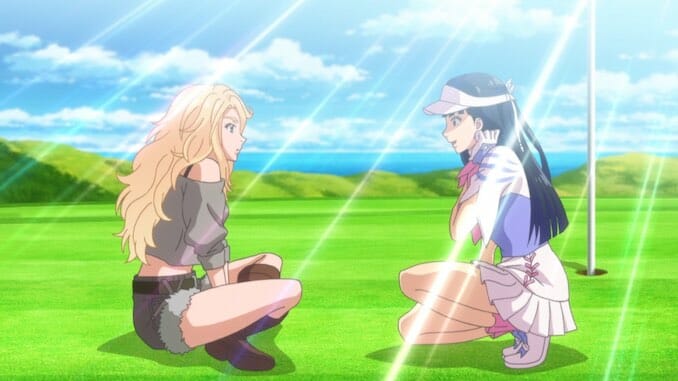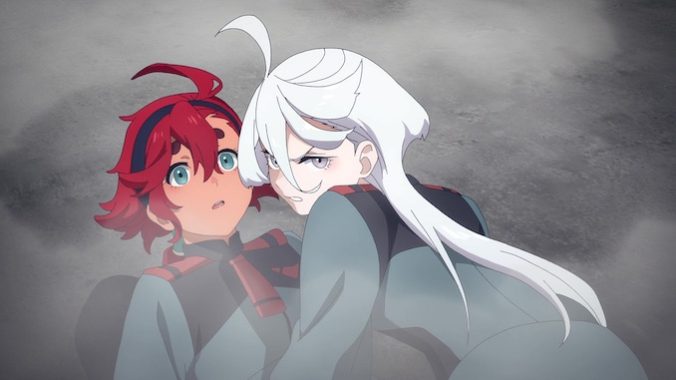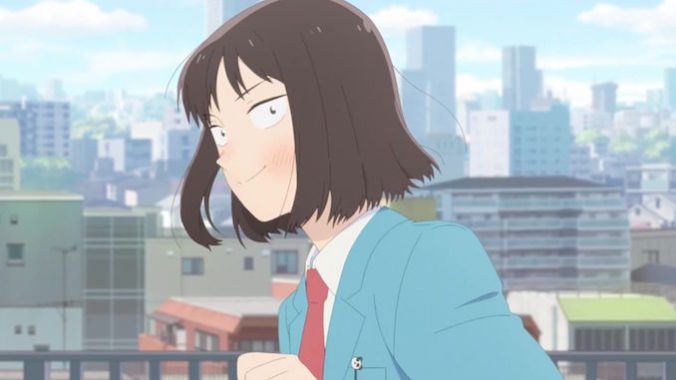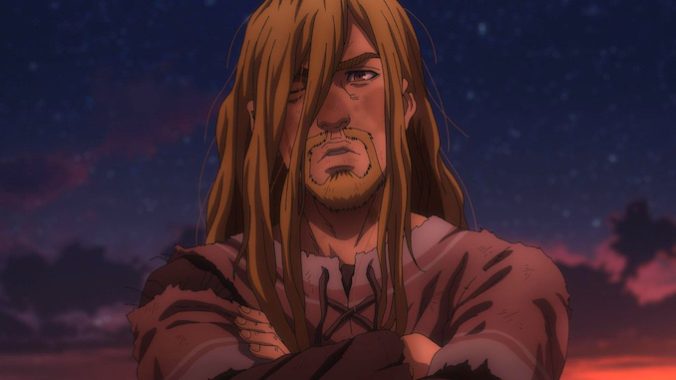With the last wave of finales from the Spring 2023 anime season in the books, it’s time to appraise the best of the best. Simply put, this was a standout batch of shows, with not only a few exemplary series at the top, but also a range of solid productions that delivered genre delights. There were fun action romps, moving romance tales, and no shortage of well-defined characters. Although I’m usually merciless in trimming down my watch list, I couldn’t bear to make too many cuts this time around, which is a testament to the quality of the group. Let’s get into it.

Honorable Mentions
Otaku Elf was an ideal palate cleanser to many of this season’s more intense offerings, a charming slice-of-life series that occasionally tapped into melancholy musings on the passage of time and loss. Its titular character, Elda, is a videogame and manga-obsessed elf who is always on the receiving end of her teenage miko Koito’s reprimands as the two preside over a shrine in Tokyo. Even if I wish it spent a little more time on its underlying drama, it was a consistently fluffy watch that made the most of its recurring gags.
While Ranking of Kings: The Treasure Chest of Courage couldn’t consistently match the highs of the base show, in large part because it was a loose collection of stories instead of a proper second season, many of its one-offs tapped into the folkloric wonder and horror of what came before. And thankfully, it managed to revitalize my interest in where this story will go next after the last season’s somewhat awkward conclusion.
Over its run, Hell’s Paradise matured from a schlocky delight of an action series into something backed by a surprisingly engaging cast. We follow Gabimaru, a renowned shinobi, and Sagiri, an executioner in the Yamada Asaemon clan under the Shogunate, as they’re forced to explore a deadly supernatural island alongside other doomed explorers. Its unsettling monster designs and willingness to kill off its characters make it quite pulpy, but it eventually endears us to those fighting to survive in this nightmarish place.
Insomniacs After School is a low-key love story about two teens who bond over their shared difficulty falling asleep as they revive their school’s astronomy club. While subdued, it excels at depicting its central pair’s anxieties, conveying how they find solace in each other.
Tengoku Daimakyo (otherwise known as Heavenly Delusion) is arguably the most visually impressive series of the season, its powerful shot compositions and consistently dynamic animation communicating the haunting undertones of this broken world. Through its imagery and characters, it makes for a rare post-apocalyptic setting that contains both kindness and the types of unimaginable cruelty you’d expect from this setup. For its first 11 episodes, it successfully weaved together two parallel stories, one following Maru and his bodyguard Kiruko as they try to find a place cryptically referred to as “Heaven” in a post-disaster Japan, and another about a group of kids with strange abilities being raised at a mysterious institute. Unfortunately, its last two episodes are marred by a sordid turn that doesn’t treat its heavy subject matter with the respect it deserves (content warnings for extreme violence and sexual assault throughout). It’s a thorny one that I wish made some different choices, but it can be undeniably spellbinding.

5. Birdie Wing: Golf Girls’ Story Season 2

In its second (and likely final) season, Birdie Wing: Golf Girls Story largely maintained the blistering power of its opening drive, delivering fairway-related absurdity that kept me guffawing at its antics until the very end. At the heart of this was its ability to dole out increasingly outrageous one-liners and improbable circumstances concerning one of the most strait-laced sports on the planet with complete deadpan, as its characters bent not only the rules of the game, but the very laws of physics in their quest to knock a small, dimpled ball into the cup. For instance, I couldn’t help but cheer every time Eve unleashed her signature “Blue Bullet” drive, which pierced through the heart of every sapphic golf girl she encountered, including that of her one true flame and greatest rival, Aoi. Just like last season, we follow these two star-crossed golfers as they attempt to meet on the green. But this time, they are blocked by every conceivable obstacle, including a cadre of villains of the week, the golf mafia, intergenerational golf trauma, and golf-related injuries and diseases. Despite this constant hum of ridiculousness, it successfully built up its melodrama as Eve and Aoi shattered through every barrier in their path. It was even able to overcome being a seemingly modest production, with just enough visual embellishment to sell its most climactic moments with aplomb. While the series ultimately felt like it needed a few more episodes to wrap up all its lingering conflicts, and its central relationship doesn’t end in as conclusive a place as I’d like, it still made for a decent finish for this cult hit. A birdie indeed.
4. Mobile Suit Gundam: The Witch from Mercury Season 2

Mobile Suit Gundam: The Witch from Mercury has always had a lot going on. Not only does it borrow heavily from Shakespeare’s The Tempest, the anime Revolutionary Girl Utena, and other Gundam series, but it also has its own complex political machinations and a massive cast. Impressively, all of its pastiche, worldbuilding, and references come together in a way that feels additive instead of convoluted. The latest batch of episodes continues to follow Suletta Mercury, an ace mobile suit pilot and student at an elite academy, who finds herself caught up in a web of schemes surrounding a powerful interplanetary corporation, as her relationship with Miorine, the heiress of said corporation, is tested. While the last season was primarily dedicated to school drama and relationships, intrigue bubbles to the forefront of this run, resulting in these sympathetically portrayed characters being placed in increasingly fraught circumstances. The days of ceremonial duels between giant robots are gone, replaced by life-or-death skirmishes fought by desperate factions. Although these many cabals and their plots are introduced in a somewhat dizzying fashion, it reiterates these events to make them easier to follow, establishing a sci-fi world where people are motivated by believable socioeconomic realities and personal beef. Along the way, it sets up plenty of crushing moments as these students face cruel twists that threaten to unmake their core beliefs. And seemingly unlike everyone else, I mostly enjoyed the rapid-fire series finale. While I admit the show could have used at least another episode or two to fully flesh out the trajectory of certain relationships or its larger thematic conflicts, particularly regarding its political circumstances, the conclusion wrapped up these characters’ journeys in a way that I could emotionally buy into. Through its battles that are equally exciting and devastating, corporate thriller machinations, and central queer romance, The Witch from Mercury delivers on a considerable chunk of its sizable ambitions.
3. Oshi No Ko

After bursting onto the stage with a gut-punch of a premiere, Oshi No Ko continued to successfully portray both the magic and ills of the entertainment industry from a clear-eyed perspective. It’s difficult to provide an overview of this one’s plot without giving away key elements of the first episode, but the story follows the famous idol Ai, an ascendant talent in the music group B-Komachi, as well as her children Aqua and Ruby, who are also attempting to break into show business. One of the series’ greatest strengths is its ability to represent the joys that this field can bring while also revealing the exploitative underbelly that defines these spaces. We witness the type of backroom deals, casual misogyny, and brutal labor conditions that plague those attempting to make a living doing this work, but we also see the personal satisfaction that comes from an inspired performance, and how music can brighten people’s lives. The cast is similarly nuanced and features many women whose goals and backstories are respectfully handled, from Ai’s quest to find genuine connection through making music, the former child actor Kana’s insecurities due to past disappointments, or Miyako’s presence as a supportive stepmom. Although elements of its “reincarnation” premise make for some uncomfortable moments early on, and there is a storyline that arguably bears too much resemblance to a real-life tragedy, Oshi No Ko generally does justice to its heavier topics, delivering a well-considered critique of entertainment spaces alongside triumphant moments that foreground the power of art.
2. Skip and Loafer

Although there is no shortage of anime about high school, Skip and Loafer differentiates itself through its boundless warmth and thoughtful treatment of its protagonists. We follow Mitsumi, a student who moves to Tokyo to attend an elite academy so she can eventually make her dream of revitalizing her rural home come true. While she’s initially overwhelmed by life in the bustling city, she is taken under the wing of Sousuke, a helpful first-year boy whose outwardly pleasant demeanor seems to hide traces of lingering pain. One of the series’ standout elements is how virtually every character is afforded an inner life—their charms, struggles, and flaws making each feel like fully rendered people instead of archetypes. For instance, although our heroine is hard-working and effortlessly kind, she also tends to stress herself out with self-imposed expectations, resulting in many sleepless nights. This complexity is also reflected in Mitsumi’s eclectic friend group, made up of popular folks who have had to deal with unwanted advances or assumptions about their personality due to their looks, as well as those who have built up walls due to past judgment. In particular, it does a beautiful job representing the friendships that form between its young women, deftly avoiding tired tropes that would pit them against one another over a love interest. And though this work is buoyed by a general sense of levity, as reflected in its warm color palette, charming art style, and bounty of affecting moments, it isn’t afraid to add tension by introducing conflicts that threaten to spoil the burgeoning romance between its central pair. In a season stacked with heavy hitters, Skip and Loafer was the show that never failed to brighten my day, its kindness and multifaceted cast making it one of the most brilliant high school dramas in some time.
1. Vinland Saga Season 2

Watch on Netflix
Watch on Crunchyroll
Despite taking place during a particularly brutal period of human history, Vinland Saga continues to nurture a seed of optimism amidst the carnage, building towards explosive moments of catharsis that make its latest season nothing short of a masterstroke. We continue to follow Thorfinn, a former Viking warrior living in early 11th century Europe, as he moves past his quest for revenge into something more. While its first season also had resonant commentary on the needlessness of violence, its tendency to frame its battles as “cool” could muddy its messaging. By contrast, the most recent run doesn’t fall into this trap. Instead of continuing to follow the perspective of Norse raiders, the latest stretch is more focused on their victims, repeatedly conveying the cruelty and suffering wrought by this culture of bloodletting. It took guts to pivot away from the more action-oriented approach of its initial episodes into the more contemplative, grounded hardships of the second batch, but this switch more than pays off. As our protagonist struggles to remember the words of his father, a legendary Viking warrior-turned-pacifist, he forms deep connections with those around him, and stews in newfound guilt over his past deeds. The result is one of the most satisfying arcs I’ve seen in quite some time, as a young man contends with the fundamental wrongness of the warmongering that surrounds him. One of the most resonant aspects of the series is that instead of focusing on individual acts of inhumanity, it instead depicts how systems of cruelty come to be through cultural and political structures, positing that building a better world is attainable if these forces are challenged. And although this all may sound didactic, it arrives at these conclusions through the experiences of its characters, building up the friendships and bonds between its beleaguered cast in ways that resonate. Studio MAPPA’s aesthetic approach emphasizes the tactile details of these people’s lives: cracked nails, scarred skin, and calloused hands portraying their daily struggles and unjust treatment. Altogether, it handles a variety of fraught subject matter in a way that feels thoughtful instead of sensationalistic. The result is a work that can shatter your heart into a million pieces, its humanist undercurrents coming across with resounding clarity.
Elijah Gonzalez is a freelance writer and former Paste intern. In addition to playing the latest indie games, he also loves film, anime, lit, and creating large lists of media he’ll probably never actually get to. You can follow him on Twitter @eli_gonzalez11.
For all the latest TV news, reviews, lists and features, follow @Paste_TV.










